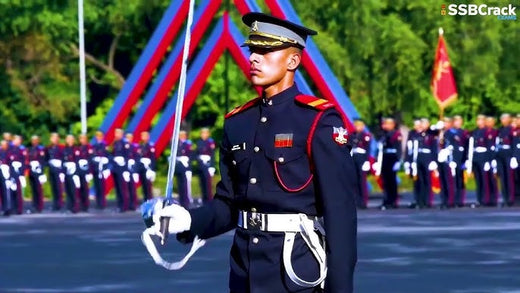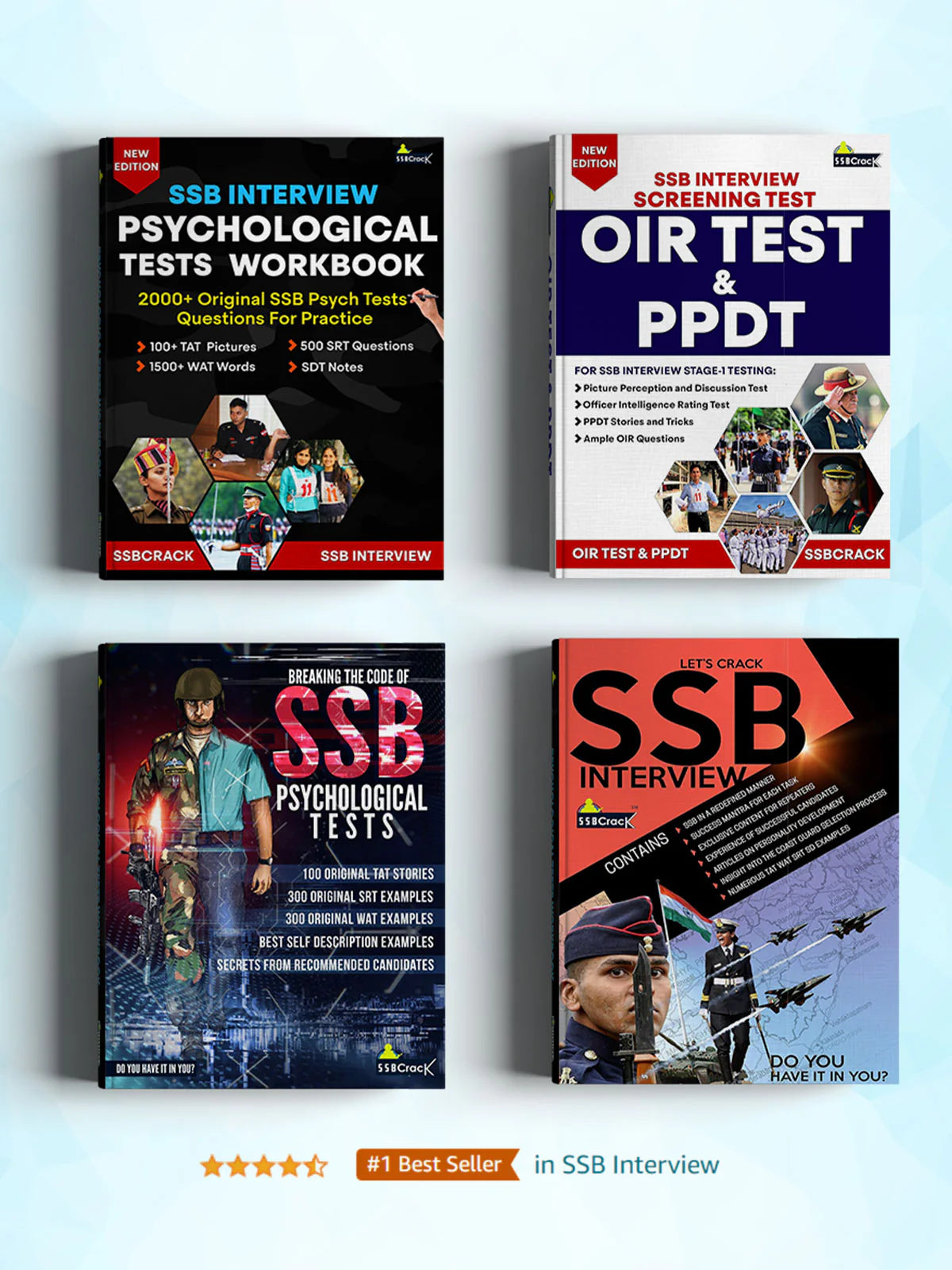Top 10 Tips to Crack the SSB Interview Successfully

The Services Selection Board (SSB) interview is a crucial step for candidates aspiring to join the Indian Armed Forces. It is known for its rigorous selection process, aiming to evaluate not just the candidates’ knowledge but also their personality and aptitude for leadership roles. During the SSB interview, candidates can expect a series of tests that assess various qualities, including psychological resilience, group dynamics, and personal integrity.
The SSB consists of multiple stages, typically spanning over five days. Each day is filled with different tasks ranging from written assessments to physical challenges and personal interviews. Candidates face tests like the Officer Intelligence Rating (OIR), Picture Perception and Description Test (PPDT), and various psychological assessments. The comprehensive nature of the SSB interview is designed to ensure that only the most suitable candidates are selected for training in the Armed Forces.
Understanding the structure and expectations of the SSB interview can significantly reduce anxiety and help candidates prepare effectively. They must familiarize themselves with the types of tasks they will face and the qualities being tested. This foundational knowledge lays the groundwork for strategic preparation, ensuring candidates approach the interview with confidence and clarity.
10 Essential Tips for SSB Interview Repeaters to Succeed
Preparing Mentally and Physically for the SSB Challenge
Preparation for the SSB interview requires a dual focus on both mental and physical aspects. Mentally, candidates should cultivate a positive mindset and develop coping strategies to handle stress and pressure. Engaging in relaxation techniques, such as meditation and mindfulness, can enhance focus and reduce anxiety. Additionally, candidates should practice visualization techniques where they imagine themselves succeeding in each task, reinforcing their confidence.
Physical fitness is equally important, as the SSB interview includes various physical tasks that assess endurance, strength, and team spirit. Candidates should engage in regular exercise routines, including cardiovascular fitness, strength training, and agility drills. This not only improves physical capabilities but also creates a sense of discipline and commitment, essential attributes for future officers.
Moreover, candidates should develop a balanced routine that incorporates study sessions, physical workouts, and relaxation periods. This holistic approach ensures that they are not only prepared for the intellectual challenges of the interview but also physically ready to tackle any obstacles that come their way. A well-rounded preparation strategy is key to standing out during the SSB selection process.
Mastering the Screening Test: OIR and PPDT
The Screening Test is the first hurdle in the SSB interview, featuring two primary components: the Officer Intelligence Rating (OIR) and the Picture Perception and Description Test (PPDT). The OIR assesses candidates' cognitive abilities through various verbal and non-verbal reasoning questions. Success in this section requires practice and familiarity with different types of reasoning problems. Candidates can enhance their performance by solving sample papers and participating in mock tests to build confidence.
The PPDT, on the other hand, evaluates candidates' imaginative and analytical skills. In this test, candidates are presented with a picture and asked to create a story based on their interpretation. To excel in the PPDT, candidates should focus on developing a coherent narrative that highlights the attributes of a leader, such as decision-making, empathy, and resilience. Practicing with diverse images and brainstorming storylines will enable candidates to think quickly and creatively.
Together, mastering both the OIR and PPDT is crucial for a successful screening. Candidates should invest time in understanding the evaluation criteria and seek feedback from peers or mentors on their performance. This preparation not only aids in clearing the screening test but also sets a strong foundation for the subsequent phases of the SSB interview.
Acing the Psychology Tests: TAT, WAT, and SRT
Psychological assessments during the SSB interview include the Thematic Apperception Test (TAT), Word Association Test (WAT), and Situation Reaction Test (SRT). The TAT requires candidates to interpret a series of ambiguous images, crafting stories that reveal their personality traits and values. This test is designed to assess creativity, emotional understanding, and problem-solving skills. Candidates should practice interpreting various images, focusing on conveying leadership qualities and positive attributes in their narratives.
The WAT involves a series of words presented to candidates, who must quickly respond with the first word that comes to their mind. This test gauges candidates’ thought processes and emotional responses. To perform well, candidates should work on their speed and clarity, ensuring their responses reflect constructive and proactive thinking. Regular practice with word association exercises can help candidates become more adept at articulating their thoughts quickly.
The SRT presents candidates with hypothetical scenarios, requiring them to describe how they would react in each situation. This test evaluates decision-making skills, ethical considerations, and interpersonal dynamics. Candidates should reflect on past experiences and develop a framework for assessing situations, ensuring their responses are consistent with the qualities expected of an officer. A thorough understanding of these psychological tests will enhance candidates' performance and showcase their suitability for a role in the Armed Forces.
Excelling in Group Tasks: GTO and GD
Group tasks play a significant role in evaluating candidates' teamwork and leadership abilities during the SSB interview. The Group Testing Officer (GTO) tasks include a series of activities that involve problem-solving and collaboration among group members. These activities assess how well candidates can work in a team, communicate effectively, and take initiative. It is essential for candidates to exhibit qualities such as cooperation, assertiveness, and adaptability during these tasks.
In addition to GTO tasks, candidates will also participate in Group Discussions (GD). GDs assess candidates' ability to articulate their thoughts, listen to others, and contribute meaningfully to discussions. Candidates should stay updated on current affairs and develop well-rounded opinions on various topics. Practicing GDs with peers can help candidates refine their communication skills and become more confident in expressing their viewpoints.
To excel in both GTO and GD, candidates must strike a balance between leadership and collaboration. They should be prepared to step up when necessary while also being supportive of their peers. Demonstrating a positive attitude, respect for differing opinions, and a willingness to learn from others will leave a lasting impression on assessors and significantly improve candidates' chances of success in the SSB interview.
Impressing in the Personal Interview
The Personal Interview (PI) is a critical aspect of the SSB selection process, providing assessors with an opportunity to evaluate candidates on an individual level. During the interview, candidates should be prepared to discuss their background, aspirations, and motivations for joining the Armed Forces. It is essential to present oneself confidently and authentically, showcasing personal experiences that highlight leadership qualities and commitment to service.
To prepare for the Personal Interview, candidates should conduct thorough self-reflection, identifying their strengths, weaknesses, and key achievements. Practicing common interview questions with friends or mentors will help candidates articulate their thoughts clearly and concisely. Furthermore, candidates should be ready to discuss their hobbies, interests, and how these elements contribute to their overall personality and suitability for a military career.
Additionally, candidates must demonstrate a genuine interest in the Armed Forces and a solid understanding of its values and mission. This knowledge can be gained through research, reading books, and engaging with current military affairs. By showcasing passion and determination during the Personal Interview, candidates can leave a positive impression and significantly enhance their prospects of cracking the SSB interview.
Developing Essential Officer-Like Qualities (OLQs)
Officer-Like Qualities (OLQs) are the cornerstone of the SSB selection process. These qualities include leadership, effective communication, decision-making, and emotional intelligence. Candidates should actively work on developing these traits, as they are vital for success in the Armed Forces. Engaging in team sports, participating in leadership roles, and taking part in community service can help candidates cultivate these essential qualities in a practical setting.
Leadership is particularly crucial as it reflects a candidate's ability to inspire and guide others. Candidates should seek opportunities to lead groups, whether in academic projects, extracurricular activities, or social initiatives. By taking on leadership roles, candidates can develop confidence, accountability, and the ability to motivate others, all of which are critical for future officers.
Emotional intelligence is another important aspect of OLQs. Candidates should practice self-awareness, empathy, and effective interpersonal communication. This can be achieved through active listening, engaging in meaningful conversations, and reflecting on personal experiences. By developing OLQs, candidates not only prepare themselves for the SSB interview but also lay the groundwork for a successful career in the Armed Forces.
Effective Communication Skills for SSB Success
Effective communication skills are vital for success in the SSB interview and in the Armed Forces. Candidates should focus on developing both verbal and non-verbal communication skills. Verbal communication involves clear articulation of thoughts, active listening, and the ability to convey ideas concisely. Candidates can enhance their verbal skills by participating in public speaking events, joining debate clubs, or engaging in group discussions.
Non-verbal communication, on the other hand, includes body language, facial expressions, and eye contact. Candidates should be mindful of their non-verbal cues, as these can significantly impact how their messages are received. Practicing in front of a mirror or recording oneself can help candidates identify areas for improvement and build confidence in their delivery.
Moreover, candidates should be prepared to adapt their communication style to different situations. Whether in group discussions, personal interviews, or GTO tasks, the ability to tailor communication to the audience is essential. By honing communication skills, candidates can effectively articulate their thoughts, build rapport with others, and demonstrate their suitability for a role in the Armed Forces.
Common Mistakes to Avoid During the SSB Interview
While preparing for the SSB interview, candidates should be aware of common mistakes that can hinder their performance. One prevalent mistake is lack of preparation. Candidates should not underestimate the importance of thorough research and practice. Failing to prepare adequately for the various tests and interviews can lead to subpar performance and missed opportunities.
Another common error is poor time management during tasks. Candidates should practice pacing themselves during the OIR, PPDT, and psychological tests to ensure they complete all sections within the allotted time. Allocating time wisely ensures that candidates can showcase their abilities effectively without rushing through responses.
Additionally, candidates should avoid being overly critical of themselves or others. Maintaining a positive attitude, even in challenging situations, is crucial. Criticism can create a negative atmosphere and diminish teamwork. Instead, candidates should focus on encouragement and support for their peers, as this reflects the qualities of a true leader.
Post-Interview Strategies: What to Do After the SSB
After the SSB interview, candidates must reflect on their experience and identify areas for improvement. This self-assessment allows candidates to recognize their strengths and weaknesses, providing insights into their performance. They should consider keeping a journal to document their thoughts, feelings, and lessons learned throughout the process.
Moreover, candidates should stay connected with peers who participated in the SSB interview. Sharing experiences and feedback can foster a sense of community and support. Engaging in discussions with others can also provide additional perspectives on the interview process and help candidates refine their strategies for future attempts.
Finally, candidates must maintain their physical and mental fitness post-interview. Whether they receive positive news or not, staying committed to personal development is essential. Continuously honing skills, participating in relevant activities, and preparing for future opportunities will keep candidates on track toward their goal of serving in the Armed Forces.
In conclusion, cracking the SSB interview requires a blend of preparation, self-awareness, and effective communication. By following these tips and strategies, candidates can enhance their chances of success in this competitive selection process.




















